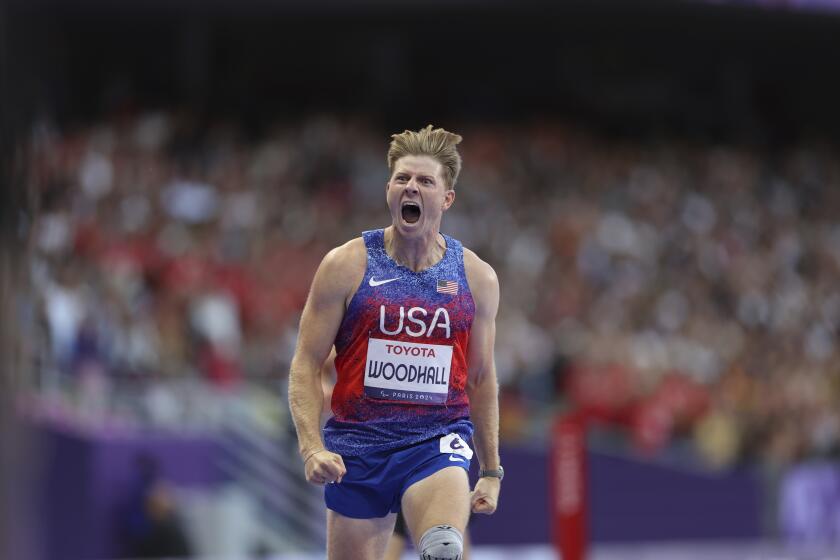Woman Breaks Olympic Barrier With V.P. Post
LAUSANNE, Switzerland — Los Angeles sports official Anita DeFrantz, the rowing champion who sued for the right to compete in the boycott-plagued 1980 Olympics, made history again Thursday, becoming the first woman to be elected vice president of the International Olympic Committee.
DeFrantz, who turns 45 next month, ran unopposed for the position, one of four vice president posts within the IOC. She was elected by acclamation during the same session at which Juan Antonio Samaranch, also unopposed, was elected to a fourth term as president of the committee.
DeFrantz becomes the highest-ranking American official on the IOC since Avery Brundage, who served as president from 1952 to 1972, and positions herself to eventually become the committee’s first female president. Samaranch, 77, concludes his upcoming four-year term in 2001. Another vice president, Dick Pound of Canada, has also been tabbed as a possible successor to Samaranch.
“This is a wonderful testament to the fact the Olympic movement does not discriminate,” DeFrantz said. “It shows that my colleagues pay attention to what you bring to the table, regardless of whether you’re a man or a woman.”
Her election was no surprise, but DeFrantz said she was still emotionally overwhelmed when Samaranch stood before the IOC and announced: “This is a historic moment. For the first time in 103 years, a woman has been elected vice president of the IOC.”
After taking several moments to try “to pull it together,” DeFrantz said later, she rose and “tried to say a few words in my very best French. They laughed politely, but they got the basic point--I thanked them with all my heart.”
Asked about a possible candidacy for the IOC presidency after Samaranch steps aside in 2001, DeFrantz said, “Right now, I figure I had better do a good job as vice president. But what happened today is a statement that, yeah, a woman could be elected to the presidency. Maybe not this woman, but some woman. Now the door is open.”
Elected to the committee in 1986, DeFrantz has served on its executive board since 1992. She is also president of the Amateur Athletic Foundation in Los Angeles, an organization that, among other things, uses interest earned by profits from the 1984 Olympics to make donations to a wide range of youth sports activities and the Special Olympics program in Southern California.
A bronze medalist in rowing in the 1976 Olympics, DeFrantz first tested the murky waters of Olympic politics in 1980, after President Jimmy Carter announced that the United States would boycott the Summer Games in Moscow to protest the Soviet Union’s invasion of Afghanistan.
Intent on competing anyway, DeFrantz, a 1977 graduate of the University of Pennsylvania School of Law, sued the U.S. Olympic Committee on the grounds that the U.S. Olympic team was a private enterprise and not bound to such decrees by the federal government.
She lost, but her landmark case paved the way for athletes from other countries that were planning to join the boycott--notably, Australia, Britain and France--to compete in the 1980 Games.
“I sued, essentially, the White House,” DeFrantz said. “If you think it’s tough suing city hall. . . .
“I was on the USOC Board of Directors at the time, elected from the Athletes Advisory Council, so I knew the structure of the USOC and saw it as a private effort. The federal government did not participate in the training [the travel] or the food or the clothing of the U.S. Olympic team.
“I did my best to demonstrate that the Games do not belong to any country and can’t be destroyed by any country. Unfortunately, we lost, but we communicated and plotted with athletes from other countries and encouraged them to compete,” she said.
“That’s how I became known to the IOC--’Who is this rower who dares to say her president is wrong?’ Without that, I would have been just one more in the allegiance of wonderful people who are rowers and it would have been ‘end of story.’ ”
Four years later, Peter Ueberroth enlisted DeFrantz to serve as vice president for the 1984 Los Angeles Olympic Committee, an assignment she describes as “another life-changing moment.” Los Angeles put on a successful and profitable Games, gaining DeFrantz a reputation among IOC members as an effective administrator.
She was elected to the IOC in 1986 in the same room of the Palais de Beaulieu in Lausanne where, 11 years later, she became the committee’s first female vice president.
Pound, Pal Schmitt of Hungary and Prince Alexandre de Merode of Belgium are the other vice presidents.
As a member of the IOC, DeFrantz has actively campaigned to increase the number of women’s sports in the Olympic program, succeeding in recent years with such additions as women’s soccer, water polo, ice hockey and softball.
“I certainly do not take credit for that,” she said, “but I’m pleased to have been helpful at the right moment.”
* VYING TO HOST GAMES: IOC decides today which of five cities will host 2004 Games. C3
More to Read
Go beyond the scoreboard
Get the latest on L.A.'s teams in the daily Sports Report newsletter.
You may occasionally receive promotional content from the Los Angeles Times.






